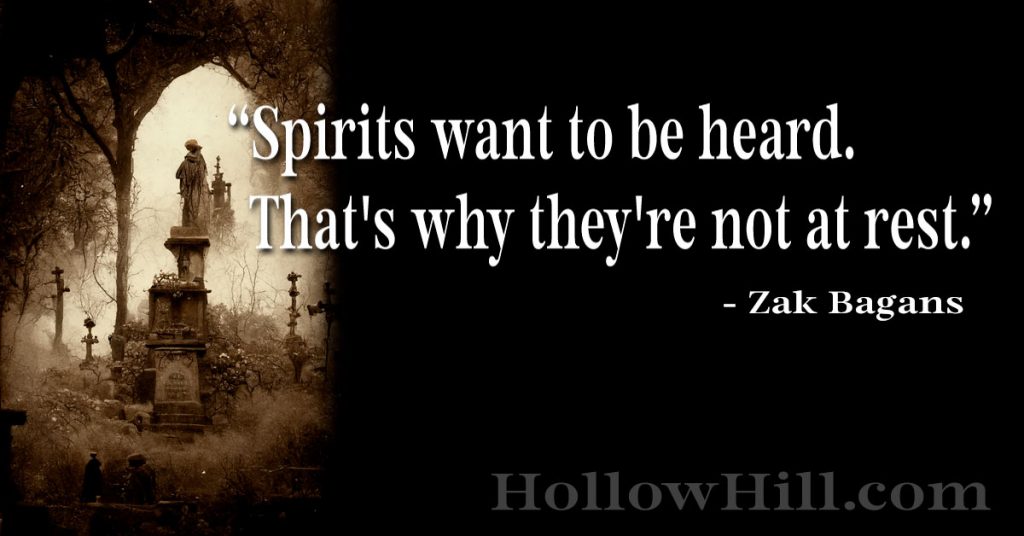As an Amazon Associate I earn from qualifying purchases. Click for details.
Some ghosts want our attention as much as we want evidence that they’re real.
We may want to hear (or see) them, as much as the ghosts want to be heard.
Listening – and I don’t mean recording them with EVP devices, but actually listening to the ghosts – can transform your ghost hunting experience.
It can bring unexpected depths to our research, and it can actually help the ghost.
Sometimes, we forget that haunted sites aren’t there for our entertainment.
The ghosts that linger there were once living people with families and friends.
They have stories to tell, or messages to share.
They’re not lab mice for us to provoke, manipulate, and study.
Every ghost has a story to tell. It may be something they feel that they have to share, before “crossing over.”
So, listening to a ghost that wants to be heard could bring them relief, and escape from a self-imposed prison.

I need to remember this myself.
Far too often, I forget to consider the ghosts’ feelings. I can be so excited to find real ghostly phenomena, that I shift into hyper-focus.
The adrenaline rush takes over.
Suddenly, I’m looking for every anomalous clue or hint, and searching to identify the most active location at the site.
Yes, I want all the evidence, all at once. And, like a little kid, I want it now.
I forget that the ghost is there for a reason. There’s a story there, and the ghost wants to be heard by someone who actually – perhaps patiently – listens to them.
And that’s the problem: It’s easy to forget that – in ghost hunting – we’re often dealing with actual, sentient spirits.
They may linger here because they’re frightened. Or, deeply immersed in regrets, they’re trying to fix something they believe they broke.
Sometimes, it’s their own life that went off-the-rails in a direction they never anticipated.
It’s even worse when the ghost’s in-life decisions caused harm – or even death – to another.
But, whatever the reason those ghosts remain here, they may just need someone to listen to them.
In fact, the ghost may want to be heard, even more than you want evidence that they’re real.
What do ghosts need to say?
Maybe they need to confess something and feel forgiven, or at least understood.
Maybe they need assurance that there is something for them, after death.
Or, no matter how big their in-life mistakes were, that “something” isn’t necessarily a fiery eternity in hell.
Maybe they just want to know that their lives meant something. That, even after death, they’re remembered.
So, as ghost hunters, we may need to pause regularly and see if we get a sense of the person behind the ghostly activity.
A little compassion can go a long way.
I’m reminded of that saying, “We’re not human beings having a spiritual experience; we’re spiritual beings having a human experience.” (Pierre Teilhard de Chardin is credited with saying that.)
When we encounter a troubled ghost, affirming that can be a compassionate part of ghost hunting.
However, if you’re more science-based, you may leave that to team members more focused on spiritual interaction.
Either way, acknowledging the spirits can be an important – even essential – part of ghost research.
Yes, some spirits may want to be left alone, thank you very much.
But even some of them may really need a listening ear.
Perhaps their bluster is really a defense. They’re trying to avoid additional pain… as if being ignored isn’t bad enough.
Take regular breaks from being an investigator.
Some – not all – ghosts want to be heard. (And some spirits aren’t benign and should not be engaged with, in any manner.)
Pause if you become too immersed in your own research – and fascinating discoveries – to remember that many (or even most) ghosts are wounded or terrified spirits.
They may respond favorably if you address them respectfully. Give the ghosts a chance to be comfortable with you in what’s become “home” to them.
It’s worth trying.
It’s also good manners.
Then, they may be more open to confirming that they are ghosts and, yes, they’re actually there.
That’s when you’ll get your best evidence that the site is haunted.
Many ghosts want to be heard. Listen to them.
Working with the ghosts as real people, rather than treating them like lab mice, can produce far better research results.
And, in general, it’s kinder and more polite.
